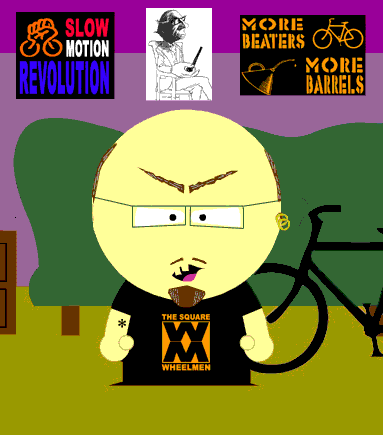Mangalore traffic taming
a thing of the past [in India]?
 There's a pretty heated set of comments over last week's Chicago traffic taming post. I'm fascinated by the fact that this seems to be the only debate over the CBF Sunday Parkways initative that I've seen anywhere online or off. During the June Chicago Critical Mass, I brought up the article with a former CBF employee. Their only comment was how great it was to have appeared on the front page of The Reader ... hmmmm ... so here's yet another example of local folks taming local traffic all by themselves; without the help of their more urbane, sophisticated neighbors %)
There's a pretty heated set of comments over last week's Chicago traffic taming post. I'm fascinated by the fact that this seems to be the only debate over the CBF Sunday Parkways initative that I've seen anywhere online or off. During the June Chicago Critical Mass, I brought up the article with a former CBF employee. Their only comment was how great it was to have appeared on the front page of The Reader ... hmmmm ... so here's yet another example of local folks taming local traffic all by themselves; without the help of their more urbane, sophisticated neighbors %)The Mangalorean, 17 May 07, Joseph Vinay writes: The movie Bicycle Thief directed by Italian director Vittorio De Seca portrays the struggle of an out-of-work man in the post-war economically depressed Italy. The plot revolves around a father and son duo trying to search for a stolen bicycle, which is vital for his job.
Gone are the days when we use to see people striding on their bicycles. Thanks to the state government's efforts whereby free bicycles were given to girls below poverty line, cycles are back in news again. With the burgeoning traffic and wide range of cars available one is forced to think that cycles have become a thing of the past. Just take a moment out of your busy schedule and watch the number of cycles on the road. You will get an answer.
Bhaskar Rao, an octogenarian nostalgically said: "In the earlier days roads were lot better and less congested. I and my friends use to cycle to and from our work place. Mangalore was less polluted then and there were fewer potholes. "It was quite common in the 70/80's to see an entire family commuting around on a single bicycle. Usually the father would pedal; the child would be perched on an improvised seat squeezed in behind the handle bars, and the wife sitting side-saddle on the rear rack." He adds, "This scene is fast vanishing with the improvement of living and economic standards. Nowadays I only see the newspaper boy and the postman coming on a cycle."
Govind V K, a resident of Suratkal said: "Roads have become quite treacherous especially the BC Road connecting Mangalore to Udupi. A cyclist can only venture into that road risking his life. NH 17 is really pathetic. Some of the stretches of the NH17 and NH48 are severely damaged. Cycling would be risky on these roads, earlier it was not so. Poor maintenance of the roads have led to inconvenience for the cyclist."
Meanwhile, in countries like Britain, it is undergoing an extraordinary renaissance. Not only it is an energy-efficient means of transport, which cuts down on the usage of petrol but is also a great way of keeping oneself healthy.
Retired army officer Maj Joseph Thankachan said: "I had put on a lot of weight and was advised by the doctor to reduce it. The doctor told me to cycle daily for an hour's time. Cycling was a great way to burn the excess of calories. It is a good form of exercise, less stressful and more fun."
Researches have also found that cycling causes less wear and tear on joints and muscles than any other form of exercise. Hence, it is safe for aged people with joint problems and disabilities. It burns around 300 calories per hour. It improves the functioning of the heart and lungs, which reduces the chances of coronary heart disease, obesity, stroke and other illnesses.
Researches abroad have also shown that it can offset the physical effects of ageing by improving the metabolism, reducing muscle wasting and also boosts mood. It also tones the lower-body muscles.
Labels: new urbanism, rolling abroad, traffic taming









<< Home